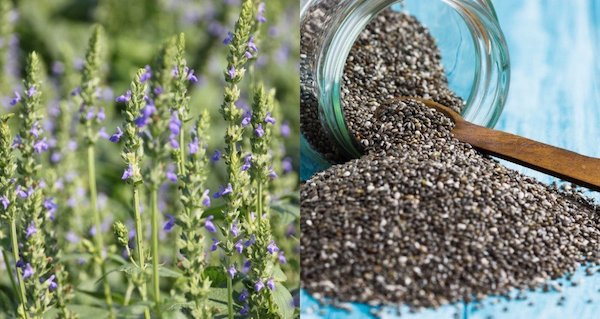This Superfood contains fiber, protein, and omega-3 oils

Years ago chia seeds were best known for the creation of chia pets, a clay form animal that sprouted chia seeds into little green chia plant “fur”. Today they’re known as a hard-working superfood that can help improve your health.
The tiny seeds come from the plant Salvia hispanica, related to mint. Seeds can be black or white; both contain the same benefits. They were once a major food crop for Aztecs and Mayans in Mexico and Guatemala, cultivated as early as 3500 BC.
It’s no wonder, these tiny seeds pack powerful nutrition. Just two tablespoons contains:
11 grams of fiber
4 grams of complete protein
5 grams of omega-3 fats
18% of RDI of calcium
30% of RDI of manganese
30% of RDI of magnesium
27% of RDI of phosphorus
They also contain ample amounts of zinc, vitamin B3 (niacin), potassium, vitamin B1 (thiamine), and vitamin B2. And they do all this in only 137 calories.
Cardioprotective effects
Chia is packed with antioxidants, which quell free radicals that can cause cell damage. Chia contains chlorogenic acid, caffeic acid, myricetin, quercetin, and kaempferol which are believed to have cardiac & hepatic protective effects, anti-ageing and anti-carcinogenic characteristics.
Because it also contains omega-3 oils in the form of alpha-linolenic acid (ALA), chia can help reduce the risk of heart disease. The Nurses Health Study found a 40% reduced risk of sudden cardiac death in women who ate the highest amounts of ALA. The Cardiovascular Health Study, which included more than 5,000 men and women age 65 and over, found a 50% lower risk of fatal ischemic heart disease with higher intakes of ALA.
The fiber in chia is largely soluble and mucilage, hence it turns gluey when wet. These fibers may help lower LDL cholesterol and slow digestion, preventing blood sugar spikes after eating and promoting a feeling of fullness. Animal studies show chia can lower triglycerides, inflammation, insulin resistance, and belly fat.
Reducing chronic inflammation
The antioxidants and omega-3 oils found in chia all contribute to an anti-inflammatory effect. One small three-month study in people with diabetes showed that eating 37 grams of chia seeds daily reduced the inflammatory marker hs-CRP by 40%.
Weight loss aid
Because chia is high in fiber and protein, it constitutes a low-carb food. Because its fiber absorbs up to 10-12 times its weight in water, it becomes gel-like and expands in your stomach. This can contribute to a feeling of fullness, slowing digestion, and eating less.
Bone building aid
Chia contains high amounts of bone building nutrients: calcium, phosphorus, magnesium, and protein. With two tablespoons containing 18% of RDA of calcium, chia offers more calcium gram for gram than most dairy products.
Easy to use
Chia seeds don’t need to be ground, as the shells break down easily in liquid. Their flavor is mild, so they can be eaten sprinkled on salads, cereal, yogurt, vegetables, or rice. They can be added to juice, puddings, smoothies, or even baked goods
REFERENCES
Harvard School of Public Health




